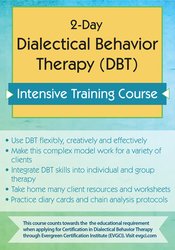

Dialectical Behavior Therapy (DBT) is an empirically validated approach for working with mental health, chemical dependency, and complex co-morbidity. Designed to empower clients to establish mindfulness, distress tolerance, emotional regulation, and interpersonal effectiveness, DBT assists clinicians in treating clients with emotional problems, suicidal, self-harm, and self-sabotaging urges and behaviours, and challenging interpersonal styles.
Watch this recording and receive a detailed understanding and foundation of the skills of Dialectical Behavior Therapy (DBT) as applied to clients with mental health and chemical dependency issues. Going beyond symptom management, these skills are designed to improve functioning to build satisfying lives.
This intensive training explores DBT’s theoretical basis, specific DBT interventions, and how to teach skills in individual and group settings. Familiarity with these skills and techniques along with experiential exercises will enhance your clinical skills and professional development.
Guided by the latest research and policy in evidence-based practices, this intensive training teaches the clinical process and content of DBT from theory to practice. Going beyond prescriptive applications, this recording shows you how to use essentials such as validation, dialectical strategies, communication styles, and the best ways of changing behaviors in order to effectively balance acceptance and change with your clients.
Complete with education on user-friendly diary cards and chain analysis protocols, you will gain increased DBT competency as well as many new tools including client worksheets to bring to your clinical practice.
Lane Pederson, Psy.D., LP, is not affiliated or associated with Marsha M. Linehan, PhD, ABPP, or her organizations.
This online program is worth 12.0 hours CPD.
| File type | File name | Number of pages | |
|---|---|---|---|
| Manual - 2-Day DBT Intensive Training Course (2.5 MB) | 72 Pages | Available after Purchase | |
| Additional Handout - 2-Day DBT Intensive Training Course (363.9 KB) | 95 Pages | Available after Purchase | |
| Additional Handout - 2-Day DBT Intensive Training Course - French (363.9 KB) | 95 Pages | Available after Purchase | |
| Manual - 2-Day DBT Intensive Training Course - French (2.5 MB) | 72 Pages | Available after Purchase | |
| Additional Handout - 2-Day DBT Intensive Training Course - Italian (363.9 KB) | 95 Pages | Available after Purchase | |
| Manual - 2-Day DBT Intensive Training Course - Italian (2.5 MB) | 72 Pages | Available after Purchase |

Lane Pederson, PsyD, LP, C-DBT, has provided Dialectical Behavior Therapy (DBT) training and consultation to over 30,000 professionals in the United States, Australia, South Africa, England, Canada, Mexico, and the Middle East through his training and consultation company, Lane Pederson and Associates, LLC (www.DrLanePederson.com). A real world practitioner, Dr. Pederson co-owns Mental Health Systems, PC (MHS), one of the largest DBT-specialized practices in the United States with four clinic locations in Minnesota (www.mhs-dbt.com). At MHS, Dr. Pederson has developed DBT programs for adolescents, adults, people with dual disorders, and people with developmental disabilities. He has served as clinical and training directors, has directed practice-based clinical outcome studies, and has overseen the care of thousands of clients in need of intensive outpatient services.
Dr. Pederson’s DBT publications include The Expanded Dialectical Behavior Therapy Skills Training Manual, 2nd Edition: DBT for Self-Help and Individual & Group Treatment Settings (PESI, 2017); Dialectical Behavior Therapy: A Contemporary Guide for Practitioners (Wiley, 2015); Dialectical Behavior Therapy Skills Training for Integrated Dual Disorder Treatment Settings (PESI, 2013) and The DBT Deck for Clients and Therapists: 101 Mindful Practices to Manage Distress, Regulate Emotions & Build Better Relationships (PESI, 2019).
Notable organizations he has trained for include Walter Reed National Military Hospital, the Federal Bureau of Prisons, the Ontario Psychological Association, the Omid Foundation, and Psychotherapy Networker. He has provided DBT training for community mental health agencies, chemical dependency treatment centers, hospital and residential care settings, and to therapists in forensic settings. Dr. Pederson also co-owns Acacia Therapy and Health Training (www.AcaciaTraining.co.za) in South Africa. Dr. Pederson currently serves on the advisory board for the doctorial counseling program at Saint Mary’s University of Minnesota and is a peer reviewer for Forensic Scholars Today.
Lane Pederson is not affiliated or associated with Marsha M. Linehan, PhD, ABPP, or her organization.
Speaker Disclosures:
History & Philosophy of DBT
Mindfulness Skills
Distress Tolerance Skills
Emotional Regulation Skills
Interpersonal Effectiveness Skills
DBT in Practice
Structure Therapy
Validation
Best Methods of Changing Behaviours
Communication Styles: Reciprocal and Irreverent Consultation Group
Next Steps: Develop Your Proficiency in DBT
| 5 |
|
| 4 |
|
| 3 |
|
| 2 |
|
| 1 |
|
Satisfaction Guarantee
Your satisfaction is our goal and our guarantee. Concerns should be addressed to info@pesi.co.uk or call 01235847393.
Please wait ...